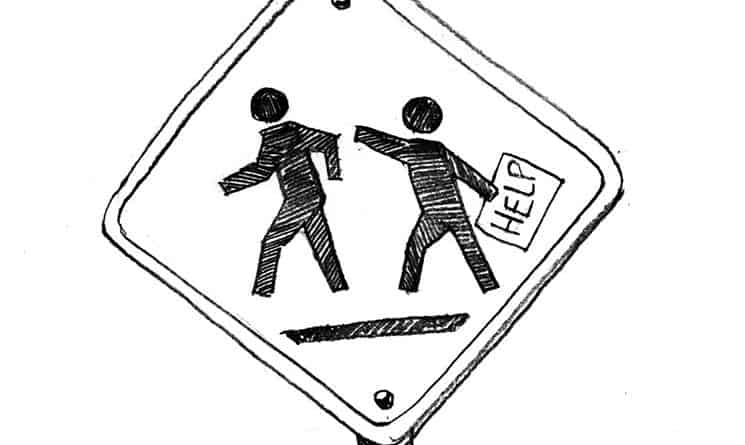City councilors in Rochester are once again debating what the city should do about panhandling. In February 2014, city officials repealed an ordinance that banned “aggressive” panhandling and prohibited soliciting money within 50 feet of banks, ATMs, bus stops, and other locations following a challenge by the New Hampshire Civil Liberties Union. A year later, a new ordinance may be on the horizon — just as the Supreme Court may take up the issue.
The council is currently considering an ordinance that would prohibit passing objects into or from a car on city roads. Violators could face a $500 fine for doing so. It’s modeled after a similar ordinance in Concord, which that city adopted as a way to limit panhandling, according to Rochester police chief Michael Allen.
While the council’s codes and ordinances committee recommended the full council pass the measure, residents raised concerns about the ordinance at a December meeting, saying that things like handing a Christmas card to a bus driver or giving money to firefighters during a “fill-the-boot” fundraiser could run afoul of the ordinance.
City councilor Elaine Lauterborn, a member of the codes and ordinances committee, said she’s been “uncomfortable” with the proposed ordinance since councilors began discussing it, but “it felt like we needed to do something. We had a number of people in the downtown area asking us to address this issue,” she said.
But panhandling is not a widespread problem, according Allen. When the city’s previous ordinance was in effect, Allen said, police “issued several citations.” There are more panhandlers out when the weather is warm, primarily near shopping plazas and big box retail stores, he said.
“We’ve had (complaints) come from the business community and had them come from motorists and pedestrians who’ve been approached,” he said. But, he said, there are few panhandlers in the city. “I think (panhandling) is limited to a small group of individuals that we … frequently deal with on that issue.”
People have a First Amendment right to be out there and ask for money … but at the same time, we want to make sure we have an environment that everyone feels safe in.
— Jeff Bisson of Rochester Main Street
Jeff Bisson, owner of Happy Pappy’s Country Store and Kitchen on Portland Street and vice president of Rochester Main Street, said panhandling was a major problem in the city a few years ago. Since then, “it’s improved 80 or 90 percent,” he said. He hopes the council enacts a new ordinance.
“People have a First Amendment right to be out there and ask for money … but at the same time, we want to make sure we have an environment that everyone feels safe in,” he said.
Rights vs. safety
Rochester isn’t alone when it comes to weighing laws dealing with panhandling. Concord and Manchester also have ordinances to curb panhandling, and it’s an issue the Supreme Court may soon address.
In 2013, a Worcester, Mass., ordinance banned “aggressive begging” within 20 feet of a bank, bus stop, or anywhere people might be standing. The ordinance’s definition of “aggressive” was broad — someone holding a sign asking for money could be charged under the ordinance if he was near a line of people, for example. The American Civil Liberties Union challenged the ordinance, but the First Circuit Court of Appeals in Boston upheld the law. The Supreme Court’s ruling last summer that struck down buffer zones around Massachusetts abortion clinics on First Amendment grounds — and a prior ruling that determined asking for money is protected speech — paved the way for an appeal of the lower court’s ruling. The court is expected to decide on Jan. 9 whether it will hear the case.
“I want to see what the Supreme Court decides,” Lauterborn said. “I hope they take the case … (so that) we’ll have a definitive opinion on if it’s a First Amendments rights issue or not.”
The council heard a second reading of the ordinance on Jan. 6. At press time, Lauterborn expected the council to send the ordinance back to the committee for further work.
Rochester’s previous panhandling ordinance was repealed last year after a challenge by the New Hampshire Civil Liberties Union.
“We had some serious constitutional concerns with it,” said Gilles Bissonnette, the staff attorney for the NHCLU. “(Rochester) ultimately agreed to repeal the ordinance … and we were very pleased with the decision.”
In August 2014, the NHCLU filed a lawsuit against the town of Hudson, charging that police officers told panhandlers that panhandling was illegal, or that they needed a permit to panhandle, which is not true, Bissonnette said.
Addressing panhandling is “a balancing act,” according to Bissonnette. “In many situations, there are legitimate public safety concerns municipalities are trying to get at,” he said. But towns and cities must do so in a way that “respects innocent, peaceful speech that the poor and homeless have a right to engage in in public.”
Ralph DiBernardo, owner of Jetpack Comics on North Main Street, said panhandling is a relatively small problem in the city. There’s one “extremely aggressive” panhandler who hangs around downtown, but otherwise, DiBernardo says, “I might see three panhandlers a week in all of Rochester.”
“You’re not walking the streets and seeing someone constantly begging you for money,” he says. “It’s just how aggressive this one individual is that makes it seem like a bigger problem.”

